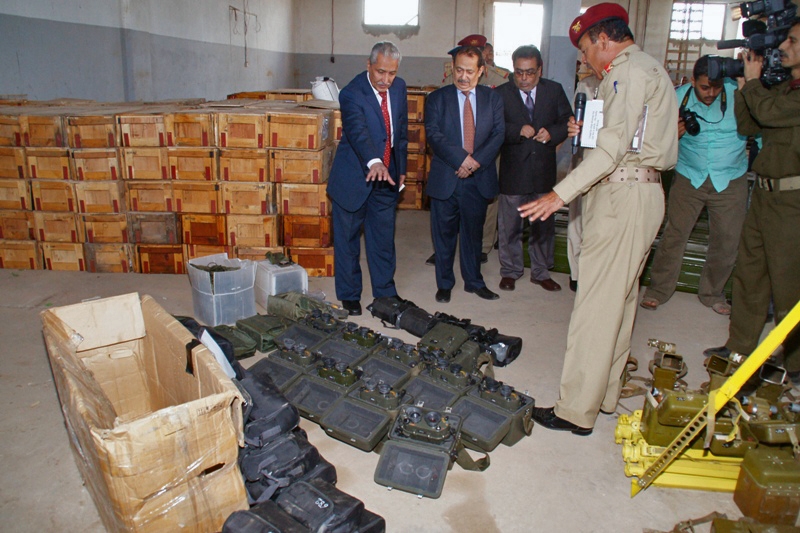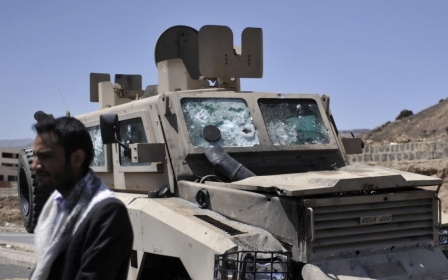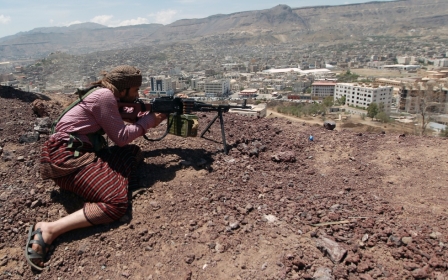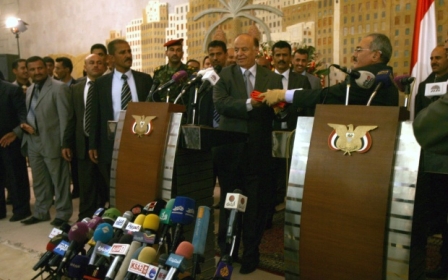Yemen frees 'Iranian guards' accused of links to Shiite rebels

Yemen has freed two Iranians said to be members of Iran's elite Revolutionary Guard who were accused of supporting Shiite rebels currently occupying the capital, Yemeni officials said.
The release of the two men, who were flown to the neighbouring sultanate of Oman, comes after the Shiite rebels known as the Houthis, or Ansarullah, seized much of the capital Sanaa following violent clashes with the Sunni al-Islah party backed by the army.
"They were flown to Oman earlier this morning," a government official who do not wish to be named told Middle East Eye via Skype. "After a thorough investigation they were both acquitted of any wrongdoing," the official said.
The pair were arrested earlier this year at Sanaa airport while trying to leave the country after what the official said was a mission to provide tactical support to Houthi fighters in their northern stronghold of Saada.
Three other Iranians of the same profile arrested near Sana'a remain in custody, security sources told AFP.
In recent weeks, thousands of Houthi supporters have been demonstrating in and around Sanaa to demand the dismissal of the government and a reduction of fuel prices.
On Sunday, Yemeni President AbdRabbuh Mansur Hadi signed a deal with the Houthi leadership aimed at ending the tension.
Relations strained
Yemen and Iran have had tepid relations since the Islamic Revolution in 1979.
Ties between the two states have been strained in recent years with Yemen accusing Iran of supporting the Houthi rebels who fought an intermittent guerilla war against the Yemeni government from 2004 to 2010. Those accusations - including claims of intercepted weapons shipments - often lacked evidence and, up until about a year ago, routinely were dismissed as propaganda.
But after the uprising in Yemen in 2011, the Houthi movement expanded from its base in the north-west Saada province - now a de facto Houthi statelet - across the country. It has benefited from widespread dissatisfaction with both Yemen’s government and the local equivalent of the Muslim Brotherhood, known as Islah.
Last year Yemen's coastguard intercepted an Iranian vessel off its southern coast trying to smuggle explosives and surface-to-air missiles to the country, the state news agency Saba reported.
With the United States and Saudi Arabia providing both public and secret security assistance there, and with Iran also said to be arming militant forces, there are fears that Yemen is becoming the battlefield for a major proxy war by outside powers.
Hardliners in Iran have expressed satisfaction at the recent successes of the Houthis.
Speaking recently about Yemen Iran MP Alireza Zakani said: “Today, the Islamic Revolution has taken over three Arabic capitals and in a while it will occupy Sanaa as well and the system to unify Muslims will become operational.”
New MEE newsletter: Jerusalem Dispatch
Sign up to get the latest insights and analysis on Israel-Palestine, alongside Turkey Unpacked and other MEE newsletters
Middle East Eye delivers independent and unrivalled coverage and analysis of the Middle East, North Africa and beyond. To learn more about republishing this content and the associated fees, please fill out this form. More about MEE can be found here.




